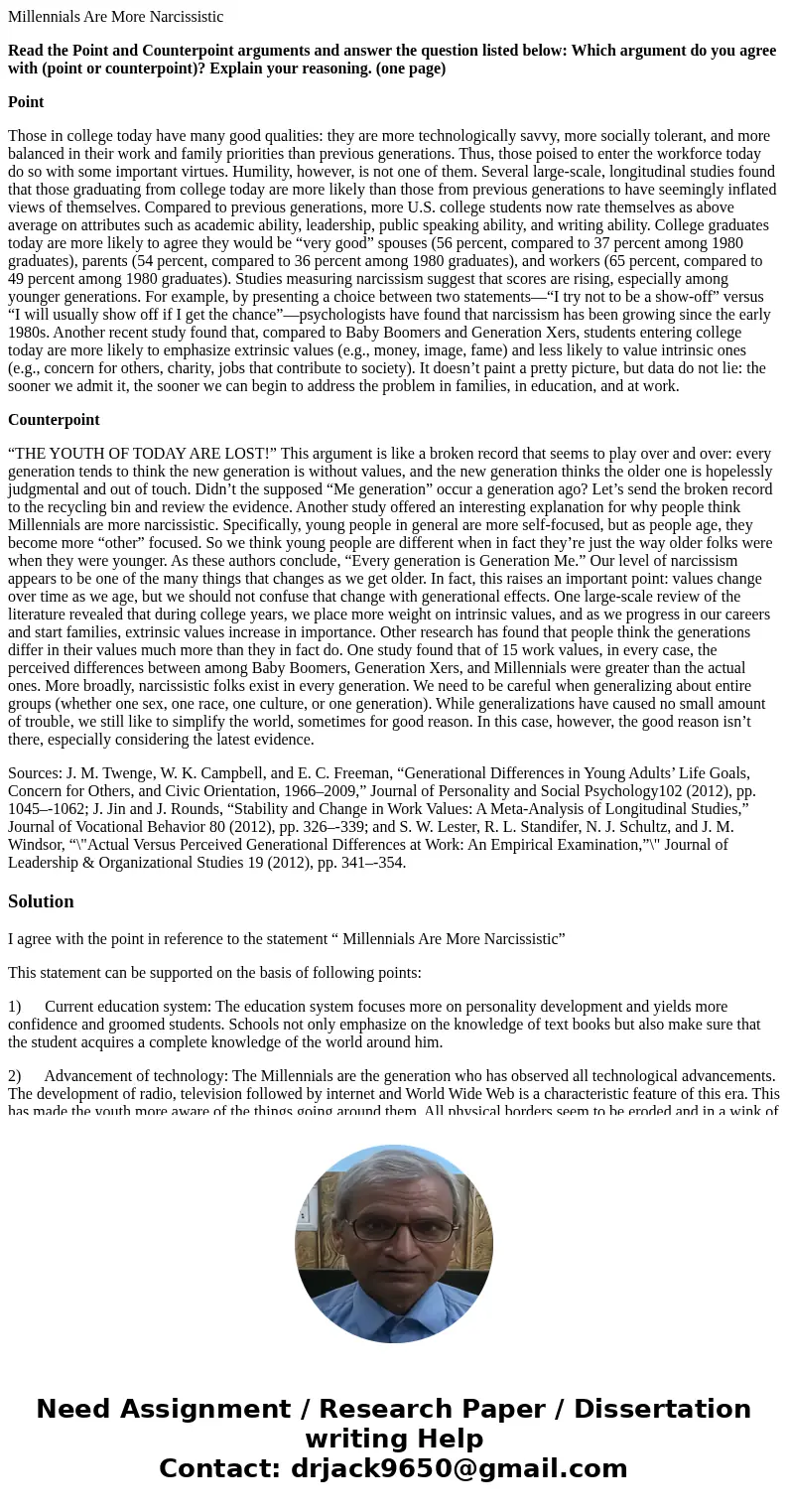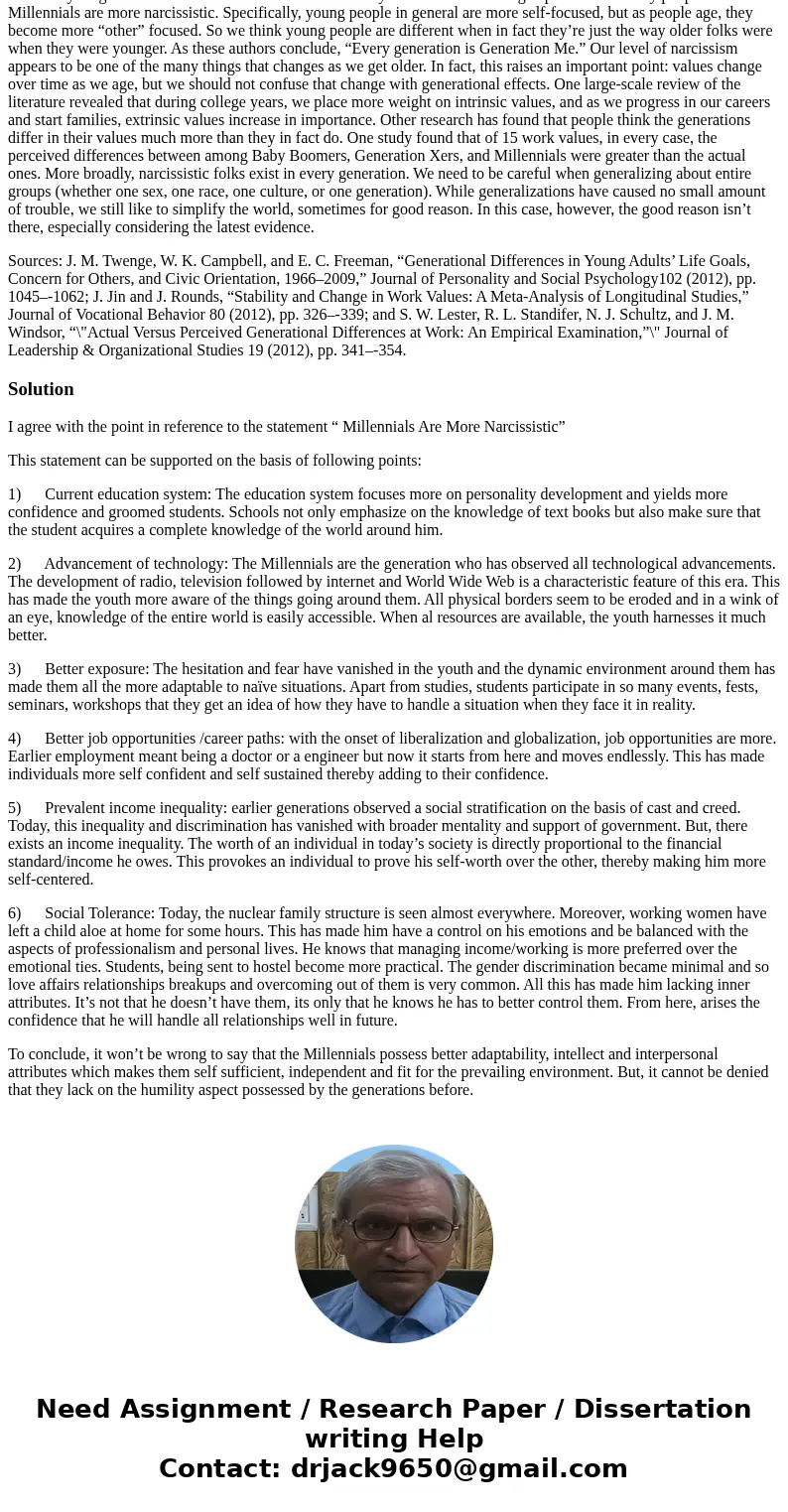Millennials Are More Narcissistic Read the Point and Counter
Millennials Are More Narcissistic
Read the Point and Counterpoint arguments and answer the question listed below: Which argument do you agree with (point or counterpoint)? Explain your reasoning. (one page)
Point
Those in college today have many good qualities: they are more technologically savvy, more socially tolerant, and more balanced in their work and family priorities than previous generations. Thus, those poised to enter the workforce today do so with some important virtues. Humility, however, is not one of them. Several large-scale, longitudinal studies found that those graduating from college today are more likely than those from previous generations to have seemingly inflated views of themselves. Compared to previous generations, more U.S. college students now rate themselves as above average on attributes such as academic ability, leadership, public speaking ability, and writing ability. College graduates today are more likely to agree they would be “very good” spouses (56 percent, compared to 37 percent among 1980 graduates), parents (54 percent, compared to 36 percent among 1980 graduates), and workers (65 percent, compared to 49 percent among 1980 graduates). Studies measuring narcissism suggest that scores are rising, especially among younger generations. For example, by presenting a choice between two statements—“I try not to be a show-off” versus “I will usually show off if I get the chance”—psychologists have found that narcissism has been growing since the early 1980s. Another recent study found that, compared to Baby Boomers and Generation Xers, students entering college today are more likely to emphasize extrinsic values (e.g., money, image, fame) and less likely to value intrinsic ones (e.g., concern for others, charity, jobs that contribute to society). It doesn’t paint a pretty picture, but data do not lie: the sooner we admit it, the sooner we can begin to address the problem in families, in education, and at work.
Counterpoint
“THE YOUTH OF TODAY ARE LOST!” This argument is like a broken record that seems to play over and over: every generation tends to think the new generation is without values, and the new generation thinks the older one is hopelessly judgmental and out of touch. Didn’t the supposed “Me generation” occur a generation ago? Let’s send the broken record to the recycling bin and review the evidence. Another study offered an interesting explanation for why people think Millennials are more narcissistic. Specifically, young people in general are more self-focused, but as people age, they become more “other” focused. So we think young people are different when in fact they’re just the way older folks were when they were younger. As these authors conclude, “Every generation is Generation Me.” Our level of narcissism appears to be one of the many things that changes as we get older. In fact, this raises an important point: values change over time as we age, but we should not confuse that change with generational effects. One large-scale review of the literature revealed that during college years, we place more weight on intrinsic values, and as we progress in our careers and start families, extrinsic values increase in importance. Other research has found that people think the generations differ in their values much more than they in fact do. One study found that of 15 work values, in every case, the perceived differences between among Baby Boomers, Generation Xers, and Millennials were greater than the actual ones. More broadly, narcissistic folks exist in every generation. We need to be careful when generalizing about entire groups (whether one sex, one race, one culture, or one generation). While generalizations have caused no small amount of trouble, we still like to simplify the world, sometimes for good reason. In this case, however, the good reason isn’t there, especially considering the latest evidence.
Sources: J. M. Twenge, W. K. Campbell, and E. C. Freeman, “Generational Differences in Young Adults’ Life Goals, Concern for Others, and Civic Orientation, 1966–2009,” Journal of Personality and Social Psychology102 (2012), pp. 1045–-1062; J. Jin and J. Rounds, “Stability and Change in Work Values: A Meta-Analysis of Longitudinal Studies,” Journal of Vocational Behavior 80 (2012), pp. 326–-339; and S. W. Lester, R. L. Standifer, N. J. Schultz, and J. M. Windsor, “\"Actual Versus Perceived Generational Differences at Work: An Empirical Examination,”\" Journal of Leadership & Organizational Studies 19 (2012), pp. 341–-354.
Solution
I agree with the point in reference to the statement “ Millennials Are More Narcissistic”
This statement can be supported on the basis of following points:
1) Current education system: The education system focuses more on personality development and yields more confidence and groomed students. Schools not only emphasize on the knowledge of text books but also make sure that the student acquires a complete knowledge of the world around him.
2) Advancement of technology: The Millennials are the generation who has observed all technological advancements. The development of radio, television followed by internet and World Wide Web is a characteristic feature of this era. This has made the youth more aware of the things going around them. All physical borders seem to be eroded and in a wink of an eye, knowledge of the entire world is easily accessible. When al resources are available, the youth harnesses it much better.
3) Better exposure: The hesitation and fear have vanished in the youth and the dynamic environment around them has made them all the more adaptable to naïve situations. Apart from studies, students participate in so many events, fests, seminars, workshops that they get an idea of how they have to handle a situation when they face it in reality.
4) Better job opportunities /career paths: with the onset of liberalization and globalization, job opportunities are more. Earlier employment meant being a doctor or a engineer but now it starts from here and moves endlessly. This has made individuals more self confident and self sustained thereby adding to their confidence.
5) Prevalent income inequality: earlier generations observed a social stratification on the basis of cast and creed. Today, this inequality and discrimination has vanished with broader mentality and support of government. But, there exists an income inequality. The worth of an individual in today’s society is directly proportional to the financial standard/income he owes. This provokes an individual to prove his self-worth over the other, thereby making him more self-centered.
6) Social Tolerance: Today, the nuclear family structure is seen almost everywhere. Moreover, working women have left a child aloe at home for some hours. This has made him have a control on his emotions and be balanced with the aspects of professionalism and personal lives. He knows that managing income/working is more preferred over the emotional ties. Students, being sent to hostel become more practical. The gender discrimination became minimal and so love affairs relationships breakups and overcoming out of them is very common. All this has made him lacking inner attributes. It’s not that he doesn’t have them, its only that he knows he has to better control them. From here, arises the confidence that he will handle all relationships well in future.
To conclude, it won’t be wrong to say that the Millennials possess better adaptability, intellect and interpersonal attributes which makes them self sufficient, independent and fit for the prevailing environment. But, it cannot be denied that they lack on the humility aspect possessed by the generations before.


 Homework Sourse
Homework Sourse